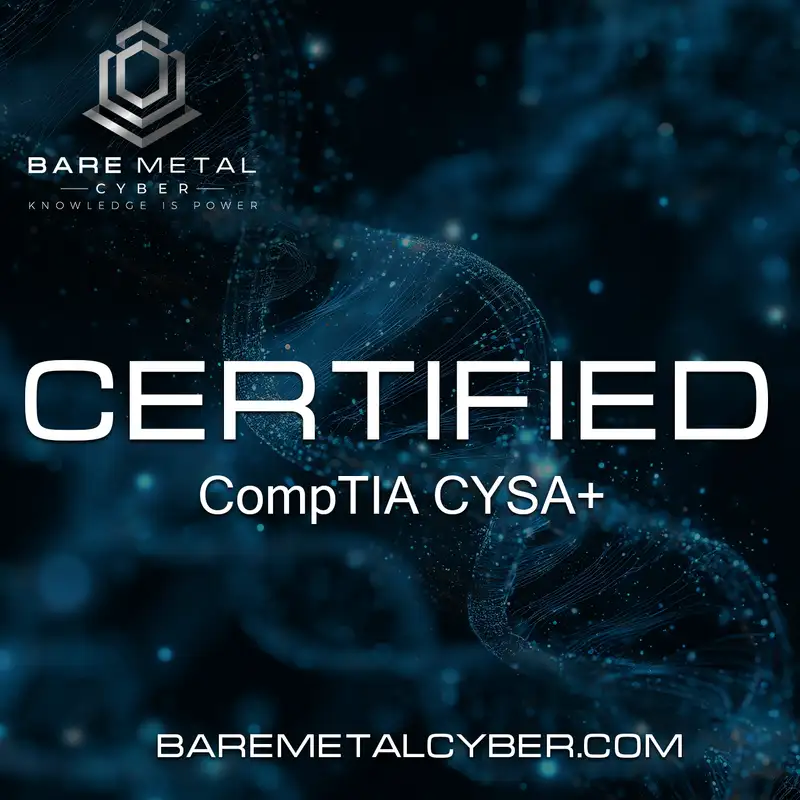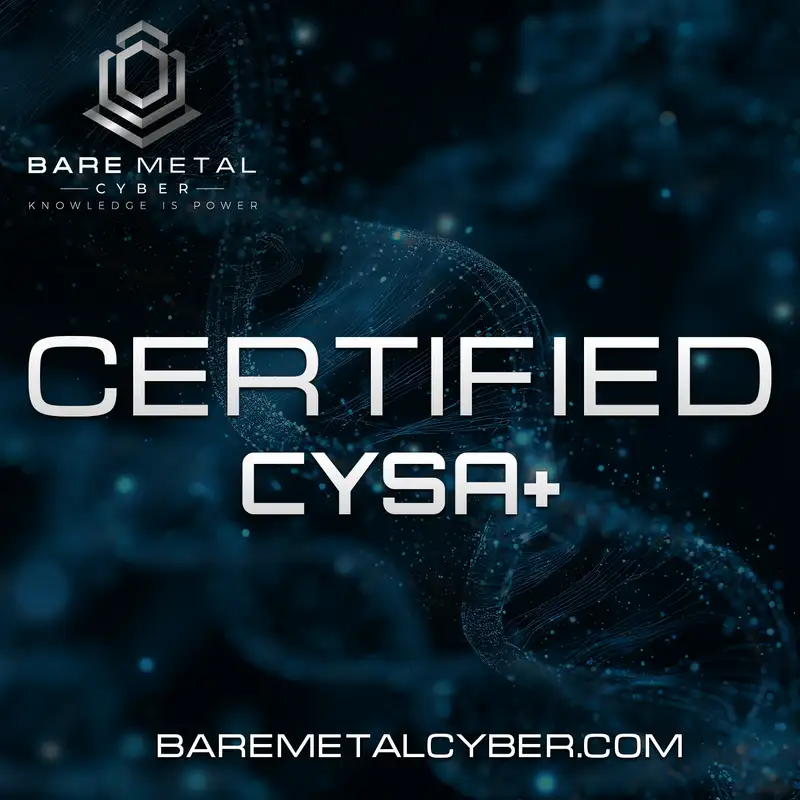Episode 3: CySA+ vs Other Security Certifications: Where It Fits
Episode 3: CYSA Plus vs Other Security Certifications — Where It Fits
Welcome to this episode of the CompTIA CYSA Plus Prep cast presented by bare metal cyber dot com. In today’s episode, we’ll examine where the CYSA Plus certification fits within the broader world of cybersecurity credentials. We’ll compare it to other entry-level, intermediate, and advanced certifications to help you understand what makes CYSA Plus distinct. If you're trying to decide whether this is the right next step in your career, this episode will provide the insight you need to make that decision with clarity and confidence.
To begin, let’s locate CYSA Plus within the overall cybersecurity certification landscape. Most certifications fall into one of three categories: entry-level, intermediate-level, or advanced-level. CYSA Plus confidently resides in the intermediate tier. It is not intended for absolute beginners, but also does not require the years of experience or managerial focus demanded by higher-level certifications. Instead, it targets individuals who already have some technical cybersecurity experience and are ready to move into more specialized, hands-on roles such as threat analysts, incident responders, or Security Operations Center technicians.
Entry-level certifications serve as the foundation of a cybersecurity career. Examples include the CompTIA Security Plus and the GIAC Security Essentials Certification, or G S E C. These credentials are often recommended for those just entering the field or for IT professionals transitioning into security-focused roles. Their purpose is to establish a solid grasp of core principles such as confidentiality, integrity, and availability, along with general knowledge of network defense, cryptography, access control, and common attack types. These exams focus on introducing concepts rather than testing deep expertise.
Intermediate-level certifications, on the other hand, are designed for professionals who have already gained some security experience and want to validate more advanced capabilities. This category includes the CompTIA CYSA Plus, as well as PenTest Plus, the Certified Ethical Hacker, and the GIAC Certified Incident Handler. These certifications presume you are comfortable with basic security concepts and are now ready to demonstrate your ability to analyze threats, apply tools, interpret data, and respond to incidents effectively in real-world scenarios.
Among intermediate certifications, CYSA Plus carves out a unique position by specializing in behavioral analytics, threat detection, and incident response. It equips candidates with skills that are vital for detecting early indicators of compromise, managing security information and event management systems, and coordinating incident remediation activities. It does not center on offensive testing or attack simulation like penetration testing certifications do, but instead focuses on monitoring and defending systems. This makes it ideal for those looking to work in defensive roles, particularly within Security Operations Centers.
In contrast, certifications like the PenTest Plus and the Certified Ethical Hacker are explicitly offensive in nature. They emphasize skills like vulnerability exploitation, red teaming, and ethical hacking practices. These certifications are excellent for individuals interested in penetration testing or assessing the security posture of networks through simulated attacks. While PenTest Plus and CYSA Plus are often viewed as parallel tracks, they differ in focus: one teaches how to find and exploit weaknesses, while the other teaches how to detect, investigate, and respond to those exploits.
On the other side of the spectrum, you’ll find defensive certifications like the Systems Security Certified Practitioner from I S C Squared and the GIAC Security Essentials Certification. These credentials do include operational topics such as access control, network protection, and risk assessment, but they often maintain a broader scope without drilling as deeply into detection tools and hands-on analytics as the CYSA Plus does. As such, while they prepare you for general security operations, they may not offer the same depth in threat analysis, SIM utilization, or response techniques.
As we move into advanced-level territory, certifications like the Certified Information Systems Security Professional and the Certified Information Security Manager come into view. These are leadership and management-oriented credentials. The Certified Information Systems Security Professional is often aimed at those pursuing roles in architecture, policy, or governance. It requires broad knowledge across multiple domains and typically presumes at least five years of experience. The Certified Information Security Manager leans toward strategic security planning and risk management, emphasizing business alignment rather than technical implementation.
Given these comparisons, CYSA Plus stands as a crucial bridge between foundational knowledge and executive-level strategic expertise. It focuses on the operational skills needed to protect, detect, and respond—essentially preparing you to be on the front lines of an organization’s security defense posture. This places it directly in the career progression between entry-level security awareness and higher-level cybersecurity leadership.
For professionals seeking employment in hands-on roles, such as security analyst, threat hunter, or incident responder, CYSA Plus aligns perfectly with the responsibilities and tools used in these positions. It validates competencies that employers look for when staffing SOC teams and threat intelligence units. Whether you're investigating log files, using a SIM platform, interpreting threat data, or leading incident containment efforts, the skills measured by CYSA Plus are directly tied to the expectations of those roles.
For more cyber related content and books, please check out cyber author dot me. Also, there are more security courses on Cybersecurity and more at Bare Metal Cyber dot com.
As we continue our comparison, it’s important to look at how CYSA Plus compares to vendor-specific certifications. Examples of these include Cisco’s CyberOps Associate, Microsoft’s Azure Security Engineer Associate, and the AWS Certified Security Specialty. These certifications are often tightly linked to specific platforms and technologies. While they offer valuable skills within their respective ecosystems, their relevance tends to be confined to environments that rely on those particular vendors. That’s where CYSA Plus provides an important distinction—it is entirely vendor-neutral. This means that its teachings and skill validations apply across a wide range of technologies, industries, and operational contexts, making it far more versatile for professionals who work in or plan to support diverse IT environments.
Vendor-specific certifications can be highly beneficial if you know your career will be focused on one vendor’s ecosystem, such as working as a cloud security engineer in an Azure-based organization. However, the CYSA Plus offers a broader approach, focusing on methods and tools that apply regardless of the platform. For instance, rather than only learning Microsoft’s or Amazon’s approach to securing environments, CYSA Plus trains you to use industry-standard tools, analyze behavior across systems, and follow universal best practices. This prepares you to contribute value in hybrid, on-premises, or cloud environments without being limited to a single vendor’s security suite.
Let’s also briefly discuss how CYSA Plus relates to CompTIA’s own advanced-level certification: the CompTIA Advanced Security Practitioner, also known as CASP Plus. While there is some overlap between the two, the focus and target audience differ significantly. CASP Plus is geared toward experienced cybersecurity professionals and emphasizes architecture, enterprise security, and implementation at a strategic level. It expects a high level of technical knowledge and a broader understanding of enterprise systems. CYSA Plus, by contrast, remains focused on practical threat detection, analytics, and incident response—all grounded in the hands-on work of security analysts rather than senior architects or decision-makers.
While CASP Plus might be appropriate for someone designing and deploying secure systems at an enterprise level, CYSA Plus is far more relevant if your role requires evaluating logs, interpreting threat intelligence, managing vulnerabilities, or coordinating the technical side of incident response. In essence, CASP Plus speaks to those defining an organization’s cybersecurity architecture, while CYSA Plus is tailored for those who live in the details—analysts actively working to keep environments secure on a day-to-day basis.
Choosing CYSA Plus is particularly advantageous if your primary goal is advancing within analyst or response-oriented job functions. It prepares you for roles where speed, accuracy, and pattern recognition are paramount. You’ll gain proficiency in using tools like SIMs, analyzing endpoint behaviors, assessing vulnerabilities, and understanding attacker tactics. These capabilities are what make CYSA Plus so well aligned with current industry needs, especially in organizations with Security Operations Centers that operate twenty-four-seven or that prioritize early threat detection.
Another important distinction is that CYSA Plus supports a proactive cybersecurity posture. Unlike certifications with a compliance-heavy or auditing focus—such as the Certified Information Systems Auditor—this certification emphasizes readiness and responsiveness. If your career ambitions include hunting for anomalies, recognizing the signs of an impending attack, or conducting forensic analysis after a breach, then CYSA Plus provides the foundation and validation for those activities. Its hands-on nature and emphasis on behavioral analytics give it a unique practical edge that few certifications in its tier can match.
Employers are increasingly seeking candidates who possess the very skills that CYSA Plus validates. Whether it’s identifying patterns that signal insider threats, dissecting malware activity through logs, or containing a phishing-related breach before it escalates, these competencies are essential in today’s fast-moving threat landscape. More than ever, companies need cybersecurity professionals who can not only spot signs of trouble but also take appropriate and effective action without hesitation. That’s why job descriptions for roles like SOC analyst, threat intelligence specialist, or incident responder frequently list CYSA Plus among the desired or required certifications.
Beyond its immediate career benefits, CYSA Plus also lays the groundwork for further professional development. Once certified, you’ll be well-positioned to pursue advanced technical certifications offered by organizations like GIAC, which include specialties in threat hunting, advanced incident handling, and malware analysis. These certifications often assume you’ve already acquired hands-on experience with tools and techniques—the very experience that preparing for and passing the CYSA Plus exam provides. It’s a credential that opens doors while keeping you firmly grounded in real-world skills.
Lastly, CYSA Plus enjoys international recognition and formal accreditation. It adheres to the standards set by the American National Standards Institute, or ANSI, which means its content, evaluation process, and testing procedures are held to a rigorous standard of integrity and consistency. Employers around the world trust that CYSA Plus holders have demonstrated the ability to operate effectively in cybersecurity roles. In addition, the certification aligns with respected cybersecurity frameworks such as MITRE ATTACK, the Cyber Kill Chain, and others, further solidifying its credibility and real-world relevance.
To summarize today’s episode, CYSA Plus occupies a strategic position in the cybersecurity certification hierarchy. It bridges the gap between foundational certifications like Security Plus and leadership-focused credentials like the Certified Information Systems Security Professional. It stands out from both vendor-specific and compliance-based certifications by emphasizing analytics, behavioral monitoring, and threat response. By choosing CYSA Plus, you’re choosing a credential that directly matches the needs of modern cybersecurity operations. It confirms your readiness to work in critical security roles and provides a clear, practical path for professional growth. Stay tuned as we continue this Prep cast series and explore each of the CYSA Plus domains in greater detail, ensuring you’re fully equipped to pass the exam and excel in your cybersecurity career.

